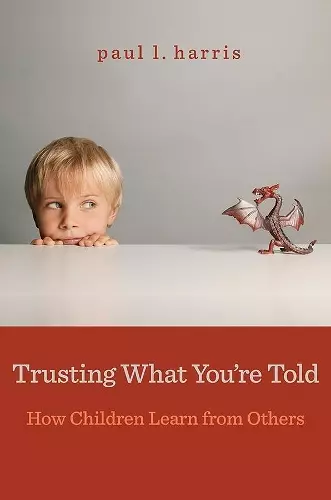Trusting What You’re Told
How Children Learn from Others
Format:Paperback
Publisher:Harvard University Press
Published:26th Mar '15
Currently unavailable, and unfortunately no date known when it will be back

If children were little scientists who learn best through firsthand observations and mini-experiments, as conventional wisdom holds, how would a child discover that the earth is round—never mind conceive of heaven as a place someone might go after death? Overturning both cognitive and commonplace theories about how children learn, Trusting What You’re Told begins by reminding us of a basic truth: Most of what we know we learned from others.
Children recognize early on that other people are an excellent source of information. And so they ask questions. But youngsters are also remarkably discriminating as they weigh the responses they elicit. And how much they trust what they are told has a lot to do with their assessment of its source. Trusting What You’re Told opens a window into the moral reasoning of elementary school vegetarians, the preschooler’s ability to distinguish historical narrative from fiction, and the six-year-old’s nuanced stance toward magic: skeptical, while still open to miracles. Paul Harris shares striking cross-cultural findings, too, such as that children in religious communities in rural Central America resemble Bostonian children in being more confident about the existence of germs and oxygen than they are about souls and God.
We are biologically designed to learn from one another, Harris demonstrates, and this greediness for explanation marks a key difference between human beings and our primate cousins. Even Kanzi, a genius among bonobos, never uses his keyboard to ask for information: he only asks for treats.
In Trusting What You’re Told, Harris argues that the longstanding idea that kids should be self-learners who gain knowledge mainly from their own explorations and observations is flawed. In the book’s introduction, Harris notes that we adults could barely get through the day without information from other people. It’s the same with kids, he says… Harris’ book explores lots of interesting ideas, including the impact of a mother’s level of education on a child’s inquisitiveness and why kids trust what they learn from their parents. -- Julie Rasicot * Education Week blog *
Harris provides an important contribution by emphasizing that children, contrary to the view of thinkers like Piaget, do not develop only into a fixed rationality. Rather, children, from a very young age, are able to negotiate the empirical world alongside the supernatural, as well as develop through the tension created by attempting to balance truth and fantasy. Harris emphasizes the notion of testimony as a means to demonstrate the agency of the child and as a central tool through which a child is able to engage in thinking about the world. -- J. A. Helfer * Choice *
The importance of learning from others was oddly neglected by too many of the twentieth-century pioneers of child psychology. In Trusting What You’re Told, Paul Harris reviews his and his colleagues’ beautiful work demonstrating just how entwined culture is with children’s development. -- Peter J. Richerson, author of Not by Genes Alone
Paul Harris has given us an intricate and beautifully detailed picture of children as budding anthropologists. They don’t just learn about the world on their own, but rather from and through ‘informants’ who provide testimony—which naturally raises issues of trustworthiness. This is a really terrific book from a researcher acutely attuned to children’s inner lives. -- Michael Tomasello, author of Why We Cooperate
- Winner of Eleanor Maccoby Book Award 2014
- Winner of Cognitive Development Society Book Award 2012 (United States)
ISBN: 9780674503830
Dimensions: unknown
Weight: unknown
424 pages